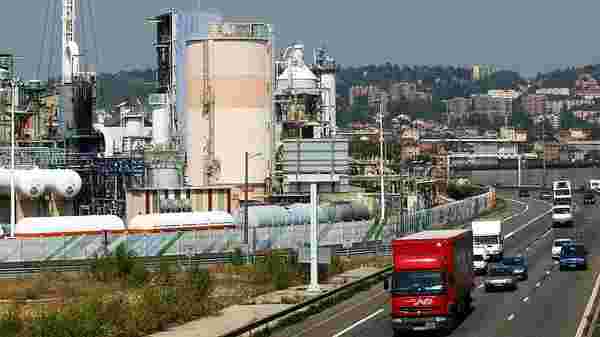‘Forever chemicals’ in tap water near Lyon: How harmful are they?
“Forever chemicals,” substances known for their incredible persistence in the environment, are being found virtually everywhere – in our clothes, our furniture, our air.
But for some 200,000 people living near chemical plants outside the French city of Lyon, potentially toxic levels of the compounds are showing up in vegetable gardens, drinking water, and even the milk of breastfeeding mothers.
A news investigation has revealed alarming levels of so-called PFAS, or per- and polyfluoroalkyl substances, in the air, ground, and water surrounding two chemical plants south of Lyon, France’s third-largest city.
The findings have prompted calls for authorities to investigate the contamination and crack down on this entire class of synthetic chemicals, which have been used for decades across a wide range of industries to make coatings and products resistant to heat, water, or stains.
What do ‘forever chemicals’ do to our health?
PFAS substances are dubbed “forever chemicals” because they do not naturally break down and instead accumulate in humans and in the environment over time.
They contain carbon-fluorine bonds, which are among the strongest chemical bonds in organic chemistry. This means that they resist degradation when used – as well as in the environment.
Most PFAS are also easily transported far away from the source of their release, in the air and water.
“They’re chronic, systemic toxicants. And what that means is that they produce diseases that tend not to show up until we age a little bit,” Jamie DeWitt, professor of pharmacology and toxicology at East Carolina University, told Euronews Next.
Exposure to high levels of PFAS has been linked to decreased immunity, hormone disruption, thyroid dysfunction, an elevated level of cholesterol, and other serious health problems including an increased risk of certain types of cancer.
“The two with the strongest linkages are kidney cancer and testicular cancer. But some studies have reported increases in breast cancer, prostate cancer, and bladder cancer,” DeWitt said.
“Are the data strong enough to support a causal link of these diseases in humans? That’s being debated right now within the scientific community. But I think those of us who study PFAS are pretty convinced that (…) the linkages between exposure and these health effects is quite strong and quite compelling”.
“I have a record of saying there really is no safe level of PFAS,” she added. “These are industrial chemicals. They don’t belong in our bodies”.
 File, 2018 – PFAS foam gathers at the the Van Etten Creek dam in Oscoda Township, Michigan, USA.Jake May/The Flint Journal via AP
File, 2018 – PFAS foam gathers at the the Van Etten Creek dam in Oscoda Township, Michigan, USA.Jake May/The Flint Journal via APChildren and babies most at risk
The experts Euronews Next spoke to said the most evident impact of PFAS so far on health is on the immune system.
“We see in children that they don’t respond as well to vaccinations. We also see that they get more frequent infectious diseases in early childhood,” said Philippe Grandjean, adjunct professor of environmental health at Harvard TH Chan School of Public Health.
Unborn children and babies are particularly vulnerable, he said, since PFAS chemicals pass the placenta into the developing fetus’ blood, and are also found in even higher concentrations in breast milk.
“So the mother shares her burden of PFAS with the next generation,” Grandjean said.
“We are essentially punishing the next generation for our mistake of using these compounds without restrictions and contaminating the environment profusely”.
DeWitt said the benefit-risk balance so far appeared in favour of breastfeeding even if mothers are exposed to PFAS contamination, but she acknowledged that’s largely because data on the topic is scarce.
“What we understand about those risks is much less than what we understand about the benefits of breastfeeding,” she said. “We know breastfeeding is very, very beneficial for babies and we know less about the risks of PFAS being transferred to babies”.
What is going on with PFAS pollution in France?
The French TV programme Vert de Rage took samples of air, soil, river water, and drinking water in the vicinity of two chemical plants in Pierre-Bénite, an industrial town by the Rhône river just south of Lyon.
It also collected samples of breast milk from 13 volunteer mothers in the region.
The team found that the levels of PFAS in samples from the Rhône river downstream of the plants were over 36,000 times those found 2.5 km upstream of the plants.
The levels of PFAS found in samples of tap water also far exceeded EU thresholds due to come into force by 2026 (over 200 ng/l, compared to a limit of 100 ng/l). That drinking water runs through the taps of some 200,000 people south of Lyon.
“I’m particularly worried about the tap water contamination here,” said Jacob de Boer, professor in environmental chemistry and toxicology at Vrije Universiteit Amsterdam and an expert in PFAS, who commented on the results during a public presentation in Lyon on Tuesday.
 File – A motorway near the town of Pierre-Bénite in France’s “Chemical Valley,” an area dense in chemical industries where high levels of PFAS have been detected.PASCAL GEORGE / AFP
File – A motorway near the town of Pierre-Bénite in France’s “Chemical Valley,” an area dense in chemical industries where high levels of PFAS have been detected.PASCAL GEORGE / AFPGrandjean, who was not involved in the study, said: “That’s a huge excess”.
He noted that Denmark’s current safety limit for PFAS substances in drinking water was 2 ng/l. In the United States, the Environmental Protection Agency has set a health advisory level of 70ng/l.
“Clearly, if we’re talking about levels that are above 100 ng/l, this means that the public use of that water must be stopped right away,” de Boer said.
The PFAS levels found in breast milk were also significantly beyond levels deemed acceptable by the World Health Organization (WHO), he added.
Environmental campaign group Générations Futures stopped short of calling on locals to stop drinking tap water or breastfeeding their babies, but said the findings raised worrisome questions and should be investigated by authorities as swiftly as possible.
What are the companies and authorities saying?
Arkema, one of the chemical plants operating in Pierre-Bénite, told Euronews Next it was not a producer of PFAS, only a “limited user” of one fluorinated additive – called 6:2 FTS – on its production lines.
It said the site, which makes fluoropolymers “designed for extreme inertness in harsh environments,” complies with all regulations in place when it comes to industrial waste and is regularly inspected by authorities.
Daikin Chemical Europe confirmed it uses Perfluorohexanoic Acid (PFHxA) in its Pierre-Bénite plant, which produces fluoroelastomers, mainly for the automobile industry.
It said it made “substantial investments” to reduce its PFAS emissions and that it captures 99 per cent of the residues in its industrial wastewater.
The Rhône prefecture, which represents the French state in the region, said in a statement that government services already inspect local chemical plants on a regular basis, but that they would now look more closely into PFAS pollution.
It added that the French government would also start working at a national level on “better understanding and fighting these pollutants”.
On Wednesday, the French environment minister Barbara Pompili issued a government order that expands the list of pollutants to monitor in surface and underground water nationwide. The list now includes a hundred more chemical substances, including PFAS.
Change is also coming at the European level.
The European Commission pledged in its chemicals strategy in 2020 to phase out the use of all PFAS across the European Union over the coming years “unless it is proven essential for society”.
Germany, Denmark, the Netherlands, Norway, and Sweden are leading efforts to restrict non-essential uses of these forever chemicals, with a proposal expected by 2023.
